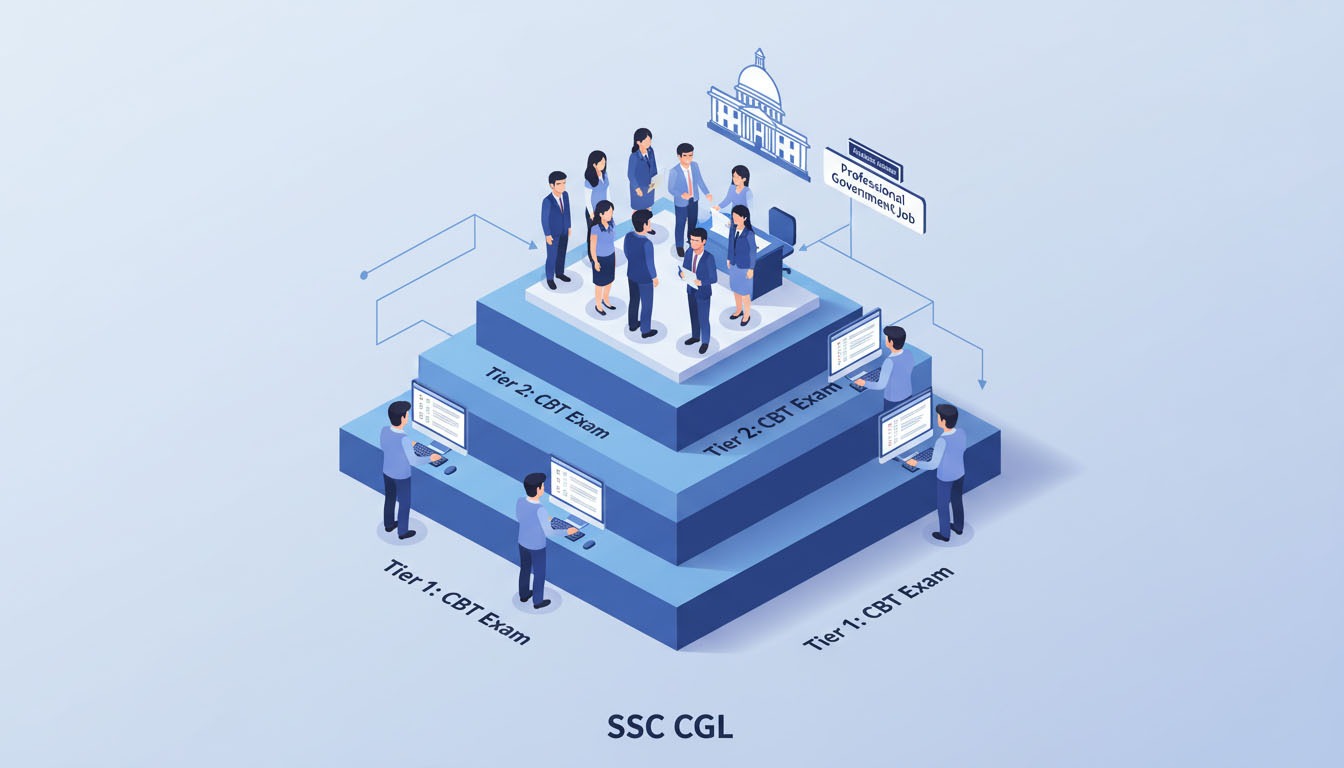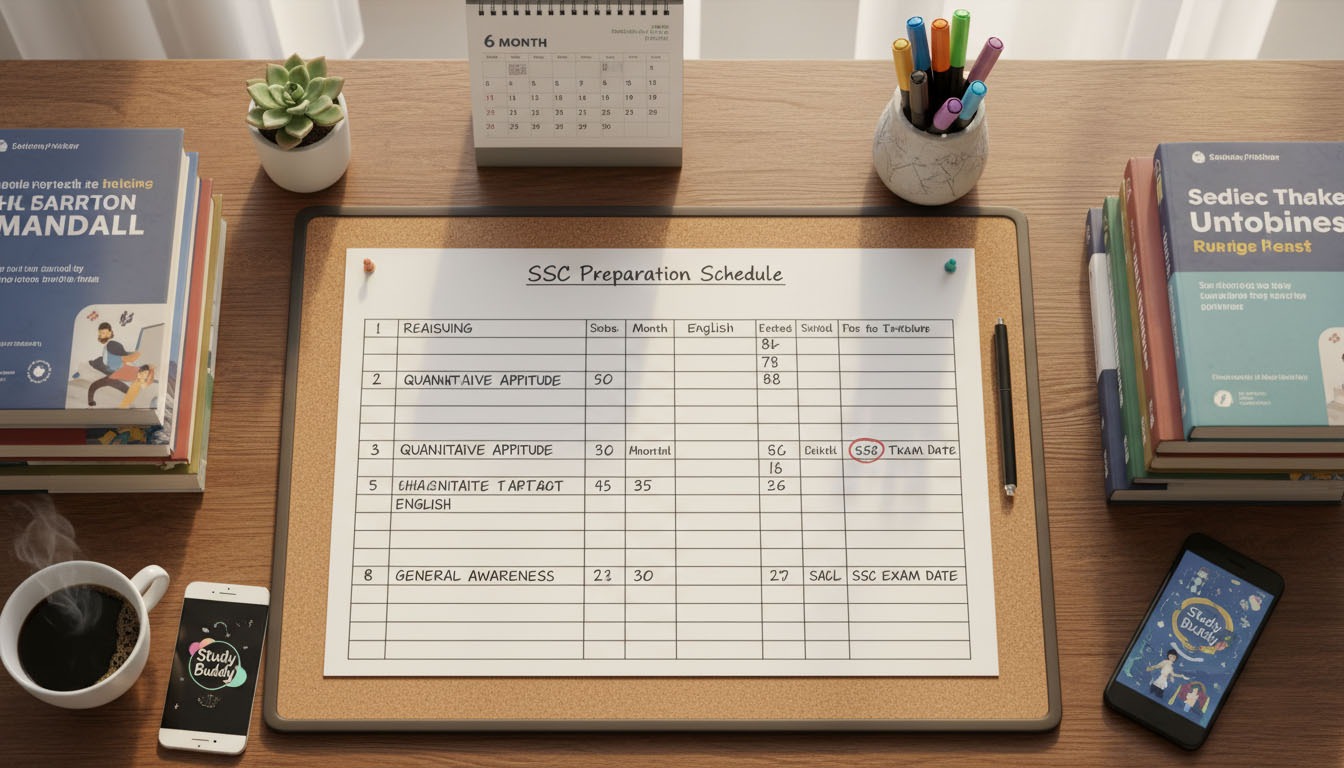Every year, over 30 lakh candidates from across India appear for SSC exams, but only a few manage to clear them. The secret to success? A deep understanding of the SSC exam syllabus. Whether you’re preparing for SSC CGL, SSC CHSL, SSC MTS, SSC GD Constable, or Stenographer, knowing the detailed syllabus and exam pattern helps you plan your preparation smartly.
Understanding the Staff Selection Commission (SSC)
The Staff Selection Commission conducts multiple exams throughout the year to recruit candidates for various Group B and Group C posts in central government departments. From clerical positions to inspector - level posts, SSC exams open doors to secure government careers.
Why Knowing the SSC Exam Syllabus Matters
Imagine preparing for a journey without knowing your destination. That's exactly what happens when aspirants start preparing without thoroughly understanding the SSC exam syllabus. The syllabus acts as your roadmap, guiding you on what topics to cover, how much time to allocate, and where to focus.
Many aspirants waste months studying irrelevant topics or miss crucial sections simply because they didn't study the syllabus carefully. This guide will ensure you don't make that mistake.
Key Takeaways for SSC Exam Preparation
Start with the syllabus: Before buying study materials, download the official SSC exam syllabus from the SSC website for your target exam.
Focus on basics first: Master fundamental concepts in mathematics and English before moving to advanced topics.
Stay updated: General awareness changes daily. Read newspapers and follow reliable current affairs sources.
Practice regularly: Solve previous year papers and mock tests to understand the exam pattern and difficulty level.
Time management: Each section has time constraints. Practice solving questions within stipulated time frames.
Know your exam pattern: Understanding whether your exam has negative marking and sectional timing helps strategize better.
Core Subject Areas in SSC Exam Syllabus
General Intelligence and Reasoning
This section tests the candidate’s logical thinking and problem - solving abilities.
Key topics include:
- Analogies and Classifications: Understanding relationships between different elements and grouping similar concepts.
- Coding - Decoding: Figuring out the patterns in alphabetical and numerical codes.
- Direction and Distance: Reasoning problems involving movement and positioning.
- Blood Relations: Family relationship problems.
- Number Series: Identifying patterns in numerical sequences.
General Awareness and Current Affairs
The General Awareness section in the SSC exam syllabus combines knowledge with current affairs, making it both challenging and scoring.
Essential areas include:
- Indian History and Culture: Ancient, medieval, and modern Indian history with emphasis on the freedom struggle and cultural heritage.
- Geography: Physical and human geography of India, including climate, rivers, mountains, and economic geography.
- Indian Politics: Constitutional provisions, fundamental rights, directive principles, and governmental structure.
- Economics: Basic economic concepts, budget, five-year plans, and current economic policies.
- Science and Technology: Basic concepts in physics, chemistry, biology, and recent technological developments.
Current affairs should cover the past 12 months, with special attention to government schemes, appointments, summits, and national / international events.
Quantitative Aptitude (Mathematics)
Mathematics in the SSC exam syllabus covers topics up to the 10th standard level, focusing on speed and accuracy. Core topics include:
- Number System: Divisibility rules, HCF, LCM, rational and irrational numbers.
- Percentage and Ratio: Problems on percentage calculations, profit and loss, simple and compound interest.
- Algebra: Linear equations, quadratic equations, and basic algebraic identities.
- Geometry: Areas and volumes of geometric figures, coordinate geometry basics.
- Data Interpretation: Tables, bar graphs, pie charts, and line graphs.
English Language and Comprehension
The English section in the SSC exam syllabus tests grammar, vocabulary, and comprehension skills.
Major components include:
- Grammar: Tenses, voice, narration, prepositions, articles, and sentence structure.
- Vocabulary: Synonyms, antonyms, one - word substitutions, and idioms.
- Reading Comprehension: Paragraph - based questions testing understanding and inference.
- Error Detection: Identifying grammatical and structural errors in sentences.
- Fill in the Blanks: Context - based vocabulary and grammar questions.
1. SSC CGL Exam Pattern and Syllabus
The SSC CGL exam pattern and syllabus include two tiers:
Tier I: Computer - Based Examination
Subjects include:
- General Intelligence & Reasoning
- General Awareness
- Quantitative Aptitude
- English Comprehension
Tier II: Computer - Based Test (Paper I, II, III)
- Paper I: Quantitative Abilities, English, Reasoning, and General Awareness.
- Paper II: Statistics (for JSO post).
- Paper III: General Studies (Finance & Economics).
Tip: Focus on quantitative aptitude and reasoning for the Tier I and II.
2. SSC CHSL Exam Syllabus
The SSC CHSL exam syllabus is divided into two tiers.
Tier I: Online Exam
- General Intelligence
- English Language
- Quantitative Aptitude
- General Awareness
Tier II: Descriptive and Skill Test
- Essay and Letter Writing (in English/Hindi).
- Skill / Typing Test for clerical and data entry roles.
Key Focus Area: English writing and typing speed are crucial for Tier II.
3. SSC MTS Exam Syllabus
The SSC MTS exam syllabus has two sessions in one computer - based exam.
- Session I: Numerical & Mathematical Ability, Reasoning Ability, and Problem-Solving.
- Session II: General Awareness and English Language.
Tip: Emphasize accuracy and speed; the exam has no interview round.
4. SSC GD Constable Exam Syllabus
The SSC GD constable exam syllabus evaluates physical fitness and basic mental ability.
Written Examination (CBT):
- General Intelligence & Reasoning
- General Knowledge & Awareness
- Elementary Mathematics
- English/Hindi
Physical Efficiency Test (PET) and Medical Exam
Candidates must meet physical standards (height, chest, running) to qualify.
Pro Tip: Maintain physical stamina alongside mental preparation.
5. SSC Stenographer Exam Syllabus
The SSC Stenographer Exam syllabus includes:
Computer - Based Test:
- General Intelligence & Reasoning
- General Awareness
- English Language & Comprehension
Skill Test: Dictation and transcription in English / Hindi.
Tip: Practice daily dictation exercises to improve accuracy.
Preparation Strategy for SSC Exams
Create a Study Schedule
Divide your preparation into three phases: foundation building (3 - 4 months), practice (2 - 3 months), and revision (1 month).
Select the Right Study Material
Choose 2 - 3 standard books per subject. For the SSC exam syllabus in Hindi, several quality resources are available from publishers like Arihant, Kiran, and Lucent.
Join Test Series
Regular testing helps identify gaps in your preparation. Join an online or offline test series that syncs with the actual exam conditions.
Focus on Weak Areas
Many aspirants make the mistake of repeatedly practicing topics they're already good at. Instead, dedicate extra time to subjects where you struggle.
Common Mistakes Aspirants Should Avoid
- Ignoring Tier - II preparation after clearing Tier - I.
- Neglecting English comprehension and vocabulary.
- Lack of time - bound practice.
- Depending only on coaching without self - revision.
Resources for SSC Exam Preparation
- Official SSC website: For notifications, syllabus, and admit cards
- NCERT books: For building strong fundamentals in general science and social studies
- Standard reference books: Subject - specific books from reputed publishers
- YouTube channels: Free video lectures and concept explanations
- Mobile apps: For daily current affairs and quick revision
- Coaching institutes: Both online and offline options for guided preparation
Conclusion
Cracking an SSC exam isn't about working harder; it's about working smarter. Understanding the SSC exam syllabus thoroughly gives you a clear advantage over thousands of other aspirants. Remember, every successful candidate was once where you are now. The difference lies in their commitment to understanding what to study, how to study, and when to revise. Start today, stay consistent, and your government job dream will soon become a reality.





